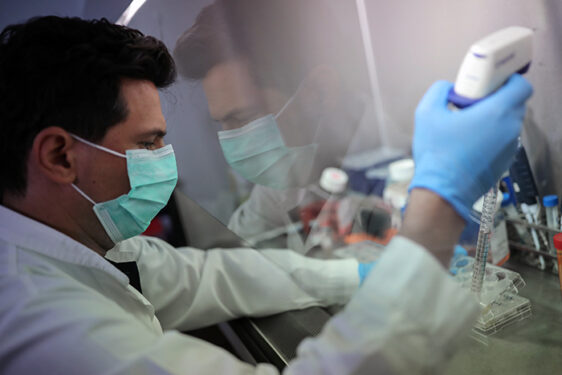
Therapeutic drug dearth forcing doctors to make possible life-or-death decisions
PROSPECT HEIGHTS — Faby Rodriguez is a newlywed, but her first year of marriage has been consumed with COVID-related illnesses that made her a prime candidate for the only monoclonal antibodies treatment effective against the omicron variant.
She tested positive for COVID-19 on Monday, Dec. 27. But because she spent much of 2021 battling and recovering from pneumonia, and also learned she has the autoimmune disease lupus, Rodriguez qualified for the treatment called Sotrovimab.
But this intravenous treatment is in very short supply worldwide. Rodriguez had to wait until Friday, Dec. 31 to receive it. And once at the hospital, she still had to wait several hours for the pharmacy to deliver the scarce medicine. But the infusions brought near-instant results.
“It’s just miraculous,” said Rodriguez, who is an employee of Desales Media Group, the parent company of The Tablet. “The next day I woke up and I had energy again. I just felt better, like I wasn’t sick anymore.”
Rodriguez realizes she was fortunate to receive the treatment, as doctors have been struggling to ration it.
In a COVID-19 briefing on Jan. 11, Gov. Kathy Hochul commented that the omicron-related spike statewide seemed to be trending downward, but hospitalizations were up and people were still dying.
“The rate of increase is slowing and, to us, that is very encouraging,” the governor said. “But we had 12,540 New Yorkers hospitalized yesterday, though, and we lost 160 of our fellow citizens. That is a sad number to have to report every day.”
Dr. Robert Tiballi, an infectious disease physician, said having to ration the life-saving treatments is disheartening for doctors everywhere, including him.
“I’m kind of overwhelmed,” said Dr. Tiballi, who works in suburban Chicago. “I mean, our hospital is completely stacked and I personally am seeing about 25% of patients. I think I’ve got like 60 patients on service right now. There’s no way all of them are COVID, but the majority are.”
Dr. Tiballi, a member of the Catholic Medical Association, explained that medical science so far has developed three monoclonal antibodies treatments: REGEN-Cov, from Regeneron; the combination of neutralizing the antibody drugs bamlanivimab and etesevimab from Eli Lilly and its partners; and Sotrovimab, from the British drugmaker GlaxoSmithKline.
“The first two are really not effective against the omicron strain,” Dr. Tiballi said. “The third one, Sotrovimab, does have effectiveness against the omicron variants. But there’s a limited supply of that. Even outside that, the stockpiles of the Regeneron and the Lilly product had been significantly depleted. My understanding is that they weren’t replaced, meaning the government didn’t order more.”
Dr. Tiballi’s assessment is consistent with Rodriguez’s experience.
“Here locally, there are so few places that give it and there’s so much demand for it … they can only do maybe like eight or 10 infusions a day, which is crazy. Absolutely crazy,” Dr. Tiballi said. “They’re scheduling patients out. If you try to get somebody in today, they’re not scheduling it for maybe seven to 10 days from now. And the whole deal with the monoclonal is to get it in fast, right away, to prevent progression of illness.”
Consequently, federal, state, and local health officials are advising doctors to follow a sort of triage concept to decide who gets priority treatment. Factors include age, pre-existing health problems, and the seriousness of the COVID symptoms.
New York State and New York City also advise doctors to consider race and ethnicity, in particular, citing that minority communities have been hardest hit by the coronavirus pandemic.
The U.S. Centers for Disease Control and Prevention confirms that African American and Hispanic communities, especially those with large immigrant populations, have experienced higher death rates.
These recommendations have drawn criticism on social media from commentators claiming these are government-issued orders to health professionals, ignoring the fact that these are merely suggestions, and that doctors make the ultimate decisions.
Basing how to treat someone solely on race is immoral and unethical, Dr. Tiballi said. He added, however, that many of his patients are from communities of color.
“We have quite a few persons who are not documented,” he said. “They work at low-paying jobs and don’t have insurance. They pay for everything in cash, and they send a lot of money back to their country of origin to support their families.”
Dr. Tiballi said his patients are about 25% vaccinated, and the remaining 75% are “very sick with underlying medical problems that have not been diagnosed because they don’t go to a doctor. I mean, a lot of people haven’t been seeing doctors for the past couple of years just because of COVID. So, yeah, it’s like a self-fulfilling prophecy.”
Other treatments, like the antiviral drugs Paxlovid (Pfizer) and Molnupiravir, also show promise, but they only received Emergency Use Authorization from the federal government on Dec. 22 and Dec. 23, respectively. It’s expected to take a few months for production to catch up with demand, health officials said.
Rodriguez, who is Latina, said she would have qualified for the treatment regardless of her ethnicity. She’s sad that people who need it have to wait. She belongs to a lupus support group that has members who post their frustrations and worries about the lack of available treatments.
“I went to the rheumatologist,” she said, “ and I was telling her that my family and I were so thankful that [she was] able to get this medication for us. And she said, ‘Oh, there’s nothing to be thankful for because you’re the kind of person that these regulations are made for.’ ”
